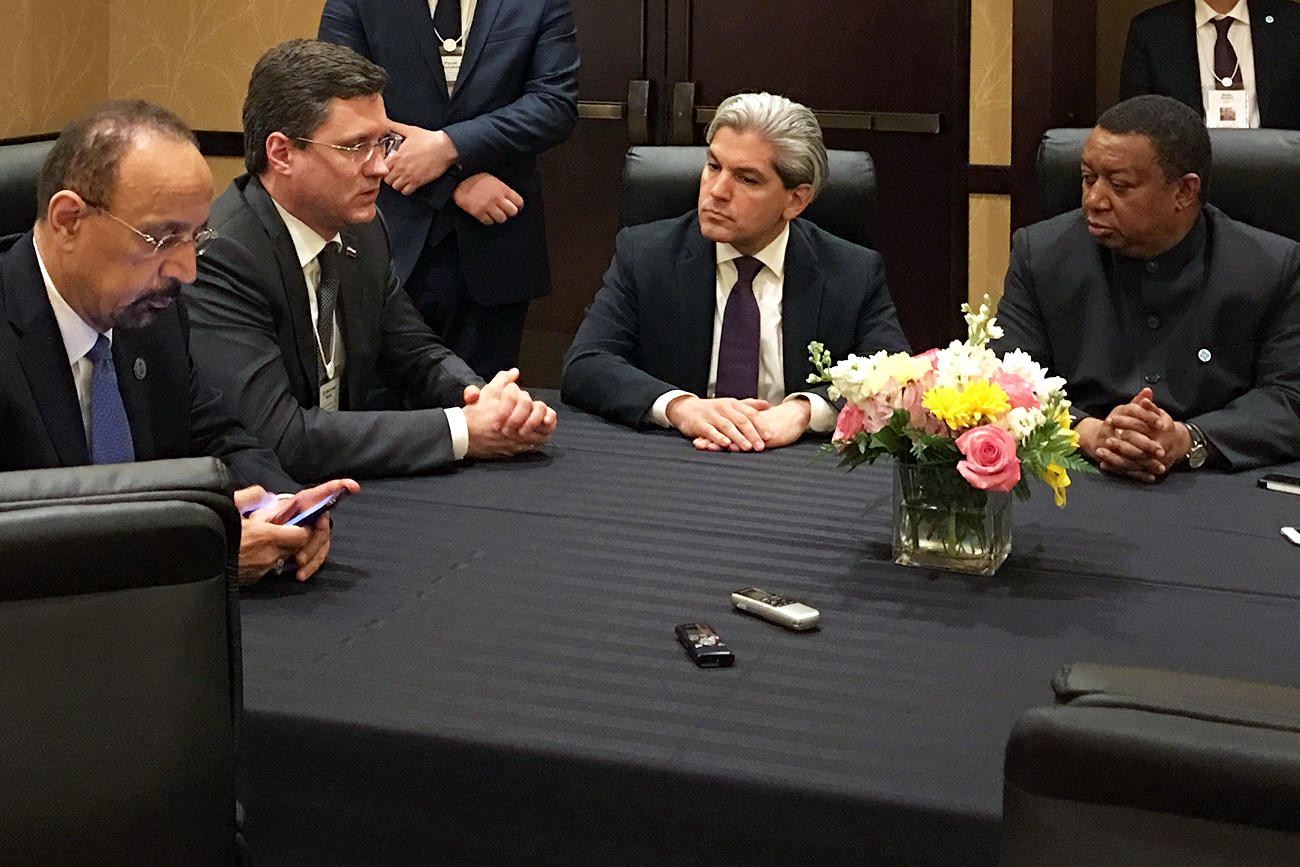
Saudi Energy Minister Khalid Al-Falih, Russian Oil Minister Alexander Novak, Mexico Deputy Secretary of Energy Aldo Flores and Secretary General of OPEC Mohammed Barkindo speak during a press conference to announce compliance on OPEC production cuts at CERAWeek in Houston, Texas, March 7, 2017ю
ReutersRussia is not considering joining OPEC, Russia's Energy Minister Alexander Novak has told a U.S. conference.
Speaking during the CERAWeek Oil Conference in Houston, Texas early March Novak added: "But our cooperation with the oil exporting countries has proven to be necessary and useful." He has often spoken in the past about OPEC's limited impact on the market.
Nevertheless, in the last months of 2016 talks between Russia and the other oil and gas producing countries were at the forefront of Russia's foreign policy efforts. On November 30 OPEC members decided to reduce oil production from 2017 by 1.2 million barrels per day. Another 11 countries, including Russia, committed to lowering oil production by 558,000 barrels per day, of which Russia's share was 300,000 barrels per day.
"OPEC and Russia do not trust one another. We are competitors, not partners," says Gleb Gorodyankin, editor of the oil market division at Thomson Reuters. It is difficult for Russia to make a deal with OPEC due to the various objectives and contradictions within the cartel, he believes. "Saudi Arabia, UAE, Kuwait, Iran and Qatar are not burdened by enormous loans and are promoting a policy within OPEC of increasing their presence on the market, while poor OPEC countries such as Angola, Nigeria, Venezuela and [Iraq's] Kurdistan [region] are primarily interested in the growth of prices in order to make ends meet," Gorodyankin adds.
It is unlikely that in the future the oil cartel will promote production limits since this has led to the growth of investment in shale oil in the U.S. OPEC countries are now attentively watching the growth of shale oil production and will decide whether or not to extend the agreement on production cuts at the end of May 2017, basing their decision on the results of the evaluation.
The U.S. Energy Information Administration predicts an increase in oil production in the U.S. of 10 million barrels per day in the near future - 10 percent higher than current levels - which would exceed the previous peak recorded in 1970. Hoping to boost oil prices, developers of shale reserves are seizing OPEC's market share since the cartel lowered the cap on production.
Vladimir Drebentsov, chief economist at BP Russia and CIS, believes OPEC will not respond effectively until U.S. shale resources are exhausted. "If prices had not increased to $120-140 per barrel, we would not have heard of shale oil deposits in the U.S. for a long time. Now it is too late. The revolution has begun. The genie has been let out of the bottle and placing him back into the bottle while wine fumes are escaping is basically impossible," Drebentsov says.
Citi Futures analyst Tim Evans says that the oil market currently resembles a paper house susceptible to destruction by any negative news. For example, in accordance with the agreement on stabilizing the market, OPEC member Iran can produce 3.8 million barrels per day. Nevertheless, the country is increasing its exports. It is actively selling the oil reserves it built up during the years when international sanctions prevented sales, reducing reserves since the beginning of the year from 29.6 million barrels to 16.4 million barrels.
Iraq is also increasing its oil production. In particular, Iraqi Prime Minister Haider al-Abadi spoke about the growth of production in the Kurdistan Region. In December oil supplies from the deposits controlled by the Kurds in Turkey reached 587,000 barrels per day, which is twice as high as the permitted quota of 250,000 barrels per day. Moreover, according to The Wall Street Journal, in January 2017 Iraq intended to increase its oil shipments from the Basra terminal to 3.53 million barrels per day. Additional volumes were to be delivered to India and China.
Another destabilizing factor is Libya, which plans to double output during 2017. The country is ramping up production at its largest deposit, the El Sharara oil field, and is renewing work at the Az Zawiya export terminal. At the beginning of January Libya started exporting 700,000 barrels per day (in December 2016 the average amount was 630,000 barrels per day).
If using any of Russia Beyond's content, partly or in full, always provide an active hyperlink to the original material.
Subscribe
to our newsletter!
Get the week's best stories straight to your inbox